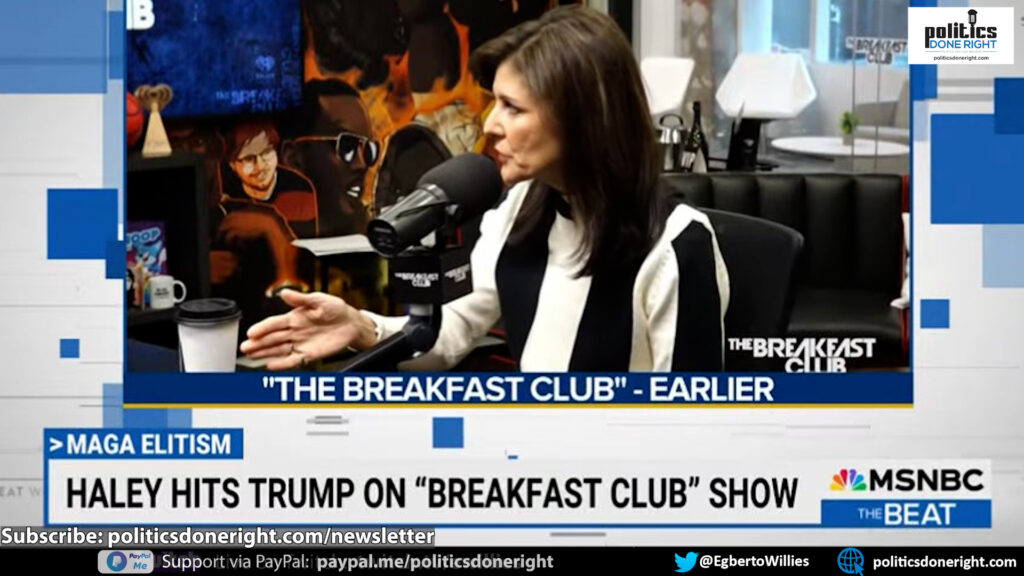Nikki Haley appeared on the Breakfast Club recently and completely destroyed Donald Trump. One wonders if she would be ahead if she did this months ago.
Nikki Haley destroys Trump.
Podcasts (Video — Audio)
In a recent seismic interview on “The Breakfast Club,” a popular radio show known for its candid political and social discussions, Nikki Haley, the last Republican standing next to the frontrunner, delivered a scathing critique of former President Donald Trump. This interview, highlighted on MSNBC, presents a moment of unequivocal clarity in American politics’ chaotic and tumultuous landscape. And Trump took the brunt of it.
Haley’s critique of Trump is unrelenting and multifaceted, highlighting his chaotic leadership, self-absorption, and disregard for the American populace. She highlights the $8 trillion debt incurred under Trump’s administration, a staggering figure that lays bare his tenure’s financial irresponsibility and mismanagement. The assertion that Trump has made politics about himself rather than the people he was elected to serve is a powerful indictment of his leadership.
Furthermore, Haley criticizes Trump’s economic policies, particularly the imposition of tariffs and his misleading attribution of stock market success to his own influence. This critique resonates with a broad section of the American electorate who have felt the pinch of economic policies that seem more oriented towards personal aggrandizement than public benefit.
On the social front, Haley condemns Trump’s approach to law and order, his handling of international conflicts, and his divisive rhetoric. She astutely points out the abnormality of America’s involvement in wars across the globe under Trump’s watch, coupled with his preoccupation with personal vendettas and trivial matters. Her remarks on Trump’s inability to win over moderates, independents, and suburban women are particularly damning, highlighting a failure to appeal to a broad demographic.
Haley’s critique extends beyond Trump to the broader political landscape, questioning the viability of having octagenarian leaders and advocating for a generational shift in leadership. This argument taps into a growing sentiment among Americans, particularly younger voters, who yearn for fresh perspectives and innovative approaches to governance.
Addressing Trump’s personal attacks on her, Haley’s response is measured yet impactful, allowing Trump’s actions to speak for themselves. This approach subtly underscores the moral and ethical shortcomings of Trump’s character, a point that resonates deeply in a politically divided nation seeking moral clarity and integrity from its leaders.
Haley’s interview is not just a critique of Trump but a clarion call for reevaluating the political status quo. Her assertions about the Republican Party’s loss in the popular vote in seven out of the last eight presidential elections is a stark reminder of the party’s need for introspection and recalibration. It speaks to a broader issue in American politics: the disconnect between political leadership and the electorate’s desires.
The interview concludes with a note of urgency and a call to action. Haley’s words are a wake-up call to the Republican Party. The message is clear: the path charted by Trump is unsustainable and detrimental to the nation’s future. The interview is a rallying cry for change, moving away from chaos and division towards a more stable, inclusive, and forward-looking political landscape.
Nikki Haley’s interview on “The Breakfast Club” is a must-watch for its direct and forthright assessment of Donald Trump and its broader implications on American politics. It serves as a powerful reminder of the need for political leaders who prioritize the welfare of the people, engage in responsible economic management, and embody moral clarity. This interview is not just a critique; it is a call to action for all Americans, irrespective of political affiliation, to advocate for a political system that truly represents and serves the needs of the people.
Viewers are encouraged to subscribe and join the conversation for more insightful commentary and to support progressive messages. Together, we can populate the internet with progressive messages that represent the true aspirations of most Americans.

